Millions of individuals worldwide suffer from halitosis, the medical term for bad breath, a common but frequently embarrassing condition. Poor dental hygiene, dry mouth, particular foods, or underlying medical conditions might all be the cause; even while it might seem slightly discomfort, chronic bad breath can significantly negatively influence one’s self-esteem and cause uneasiness in romantic relationships, social situations, and even professional communication.
Most individuals turn to mouthwash or mints for short-term solutions, but they only temporarily cover up the issue. Rather, natural therapies address the underlying source of the problem and provide a more long-lasting, side-effect-free solution. Nature offers effective solutions for cleaner breath, from tried-and-true herbs to do-it-yourself detoxification procedures.
We’ll reveal 15 natural cures in this article, many of which you’ve probably never heard of. Prepare to discover unexpected yet potent remedies beyond the standard toothpaste and toothbrush routine.
Read More: Say Goodbye to Breast Pain with These 10 NATURAL Remedies!
Causes of Bad Breath?
Halitosis, a medical term for bad breath, is a widespread occurrence which affects one in four people worldwide. That margin is relatively narrow. There are several simple and efficient ways to treat halitosis, even if it can be humiliating and even cause anxiety in some people.
To understand what remedy to opt for, it is first necessary to understand the reasons for bad breath. To make it much easier, we have enlisted the common causes of bad breath that one needs to be alert about:
General Oral Health: Poor oral hygiene is the leading cause of foul breath. If you don’t routinely clean your teeth and entire mouth, food particles may stay in your mouth, and a sticky bacterial buildup, called plaque, may develop on your teeth. Your breath may smell because of food particles and bacteria trapped in your mouth by the uneven surface of your tonsils and tongue.
Eating Flavorful Food & Drink: Odor-causing food particles enter bloodstream after eating specific food, such as onions, garlic, some vegetables, and spices. These particles are then transported to the lungs, altering the smell of your breath every time you exhale.
Alcoholic Beverages: Drinking alcohol increases your risk of developing foul breath because it is another cause of it. Alcohol use, especially excessive consumption, can reduce salivary flow, which creates an ideal habitat for bacteria that cause odors to thrive.
Heavy-Sugar Diets: Because sugars interact with bacteria already present in your mouth, a diet heavy in sugar can cause plaque accumulation, foul breath, and even halitosis. Your mouth’s natural bacteria turn sweet delicacies into sour odors by feeding on sugars.
Dry Mouth: Saliva keeps our mouth clean by eliminating food particles that cause bad breath. Bad breath will likely occur when salivary flow slows or ceases, a condition called xerostomia. It usually happens as you sleep, so most individuals wake up with rather foul-smelling breath.
Digestive Issues: Intestinal issues, constipation, or poor digestion can cause bad breath from the stomach. Bad breath or halitosis may result from the smells of previously eaten food, which easily returns up the esophagus and into mouth if you have acid reflux regularly.
What to Do for Bad Breath?
Most people agree that bad breath can sometimes cause embarrassing moments, but a well-informed person can easily prevent them with the proper methods. If you are looking for easy ways to get rid of halitosis or simply preventive measures that can help with the issue, this section is for you to delve into.
Some of the most effective ways of prevention of bad breath include:
- Improved dental health with regular brushing and flossing is a must
- Rinse your mouth at regular intervals to keep it moist and to wash out the building bacteria
- Keep your tongue clean because that is where the bacteria resides the most
- Cut down the consumption of tobacco
- Leave the food that can be responsible for causing bad breath
- Skip out on the sugar-filled mints and opt for sugar-free gums instead of that
- Keep the gums healthy because gum diseases often cause bad breath
- Consult a doctor if the situation persists even after the administration of several natural remedies
Read More: Adaptogens for Stress: Natural Remedies to Calm Your Mind and Body
Home Remedies for Bad Breath (Halitosis)
Bad breath might be a problem, but it can easily be fixed with some of the easiest natural home remedies lying around your house. If used regularly, these remedies are not only effective temporarily but tend to eradicate the problems from the root.
1. Consume Water

Drinking at least six to eight glass of water daily is generally advised because the human body requires it to function correctly. Water also helps with foul breath and keeps the body hydrated.
Since the water removes food particles, there will be nothing left for bacteria to consume, resulting in healthier teeth and gums. Additionally, it weakens your mouth’s acid, which erodes tooth enamel. Additionally, the water’s fluoride protects against acids and reverses tooth decay. The ultimate result is a healthy mouth that is less likely to produce foul breath.
2. Parsley

Parsley is a common traditional cure for foul breath. Its fresh aroma and the high chlorophyll content suggest that it can have a deodorizing impact. Research has demonstrated that parsley can efficiently counteract nasty sulfur compounds, although it hasn’t been tested on human breath.
Chew on fresh parsley leaves after every meal or purchase a parsley nutritional supplement here to treat foul breath.
3. Apple Cider Vinegar

Apple cider vinegar is a excellent natural treatment for bad breath, while it might not seem like the most appetizing approach. Its reputation for pH level balancing makes it an ideal remedy for stomach odor.
For best results, take it with a glass of water and a tablespoon of apple cider vinegar. This combo is a great way to treat bad breath odors and improve your digestive system. Drink it before any meals.
Read More: Natural Remedies for Common Pregnancy Symptoms
4. Lemon Juice
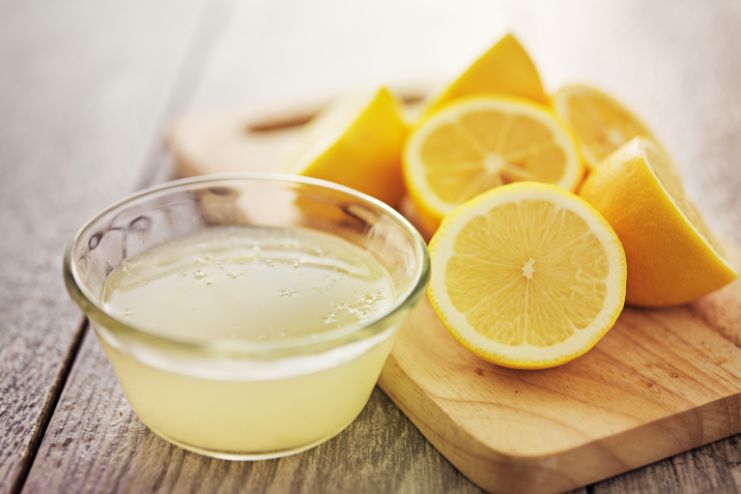
Chewing on some lemon peels can help freshen your breath, but not everyone enjoys the sour taste of lemon. The peels create a fresh scent and aid in destroying microorganisms that cause odors.
Making a mouthwash with lemon juice is another approach to maximizing its benefits. After adding the lemon juice to 1 cup of water, rinse mouth with the solution.
Lemon’s citric properties can also encourage salivation, preventing dry mouth and combating foul breath.
5. Use Warm Salt Water to Rinse
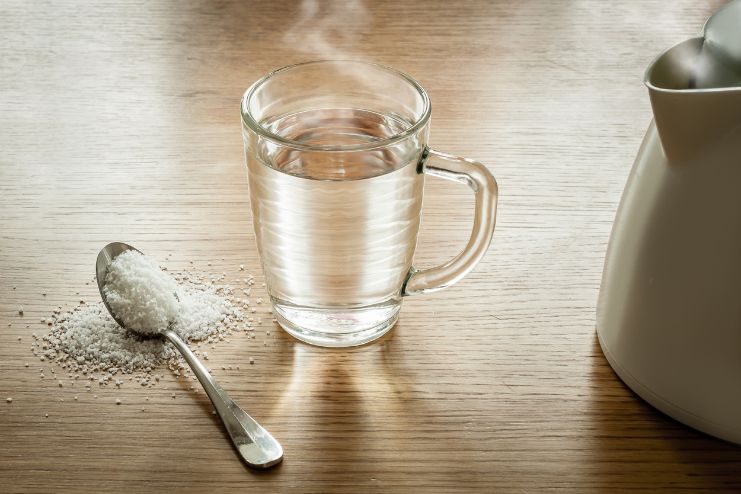
It is a natural and affordable way to nourish your oral environment. Swishing with salt water lowers plaque and irritation in mouth and inhibits the growth of bacteria. It reduces your risk of getting sick or acquiring gum disease, cavities, poor breath, or sore throat.
Eight ounces of warm water and ¼ to ½ teaspoons of salt can be used to make your own rinse. After about 30 seconds of swishing a mouthful, spit it out. Repeat as frequently as you like. Remember that salt might dehydrate and isn’t good for you if you drink the mixture.
6. Pineapple Juice

Many people think drinking pineapple juice is the easiest and best way to treat bad breath. Although this notion has little scientific support, anecdotal data indicates it is effective.
After each meal, sip a glass of organic pineapple juice or chew on a slice for a minute or two. Remember to rinse your mouth after consuming fruit and fruit juice to remove any remaining sugars.
Read More: 10 Natural Remedies to Boost Digestive Health from the Comfort of Your Home
7. Baking Soda
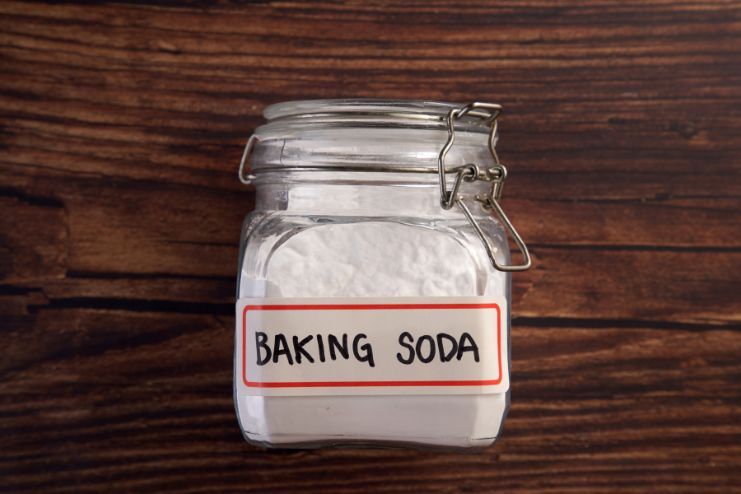
To treat halitosis, use baking soda to create a nearly alcohol-free substitute mouthwash solution. Baking soda has properties that can help you manage the amount of acid in your mouth and eliminate any lingering odor.
Add 1 teaspoon of the baking soda to one cup of water as a natural breath freshener. Add few drops of peppermint essential oil, which has antibacterial qualities and can stop the growth of oral bacteria.
On the other hand, using less water will create a natural toothpaste-like substance that you may use to clean your tongue and teeth.
8. Munch on some Cloves
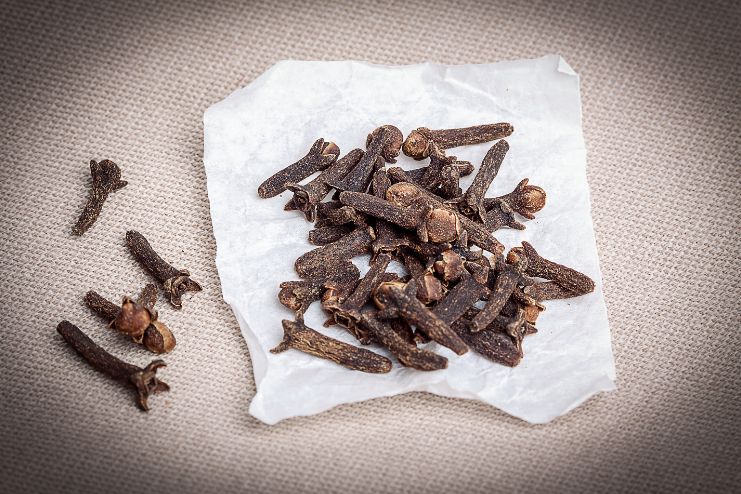
Get the herbs out of your pantry! Cloves, for instance, aid in the battle against oral germs and provide quick breath freshness. Some are portable and can be chewed or sucked on throughout the day—just a friendly reminder: either clove oil or clove powder can burn.
9. Drinking Green Tea

Green tea is made from leaves of Camellia sinensis plants, which are high in antioxidants. Its antibacterial qualities are beneficial to general health and can even fight off the bacteria that causes halitosis in your mouth.
In fact, one of the antioxidants in green tea can stimulate the production of antimicrobial compounds from gum cells, preventing gum disease and foul breath.
Drinking 1 cup of green tea once or twice a day is far easier to develop than making your mouthwash rinses, and you can even carry these beverages with you!
Read More: 15 Natural Remedies For Old Scars – Fasten The Healing!
10. Milk

Milk is a popular remedy for foul breath. Research shows that “garlicky” breath can be greatly improved by drinking milk after consuming garlic.
This technique involves drinking a glass of full-fat or low-fat milk during or after a meal, including items with strong smells, such as onions and garlic.
11. Chew Gum

After eating, chewing gum—especially minty gum—helps remove leftover food particles and microorganisms. Since not everyone always has a toothbrush, gum helps increase salivation and keeps your mouth clean until you can brush adequately. Naturally, chewing only sugar-free gum is crucial.
12. Creating a Rinse With Cinnamon

Cinnamon may be one of the best natural treatments for foul breath. It contains an essential oil called “cinnamic aldehyde,” which helps eliminate oral germs and mask unpleasant odors.
Adding cinnamon powder to a kettle of boiling water is ideal for this halitosis cure; it’s even better to add cardamom seeds and bay leaves.
Rinse your mouth twice a day with the cinnamon water-like mouthwash after straining the water to remove extra leaves and seeds.
13. Seeds of Anise or Fennel
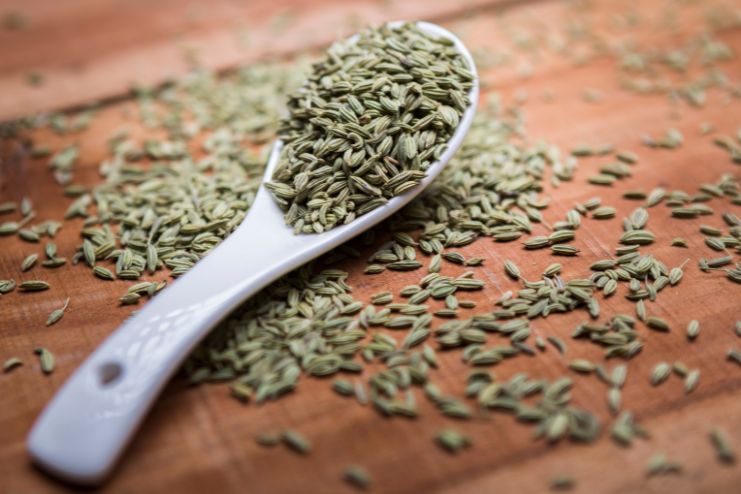
Since ancient times, people have used anise and fennel seeds to freshen their breath. Roasted fennel seeds are used as mouth freshener, or “mukhwas,” in some regions of India to freshen breath after meals.
They have a sweet taste and fragrant essential oils that infuse the breath with a new perfume. You can consume fennel and anise seeds raw, roasted, or sugar-coated.
Read More: At Home Fungal Skin Infection Treatment – 10 Natural Remedies That Work
14. Oranges

Oranges are suitable for your teeth and are a nutritious dessert. Lack of saliva to wipe away nasty-smelling bacteria is why many people have bad breath.
According to the research, vitamin C can help eliminate foul breath by increasing saliva production. A good source of this vitamin is oranges.
15. Fruits and Vegetables

Like general health, eating fruits and vegetables leads you toward fresh breath. Apples, celery, and carrots are the finest foods in this category to eliminate any bad breath since they work similarly to a toothbrush to remove the bacteria from teeth. Additionally, they make you salivate more.
Vitamin C, abundant in the citrus fruits like oranges, lemon, grapefrui, and limes, supports healthy gums. These are all efficient natural ways to combat foul breath and boost salivation.
What are the Health Conditions that Cause Bad Breath?
While the article has already mentioned the common reasons for bad breath, a few more health conditions are responsible for halitosis. Some of these health conditions include:
- Chronic inflammation or infection in the nasal cavity
- It’s time to give up smoking
- Several forms of cancers
- Dental problems
- Your teeth’s plaque
Read More: 14 Natural Remedies For Receding Gums For A Better Oral Health
Conclusion
Nature provides some of the most gentle yet effective remedies for bad breath. These cures, which include herbs like parsley and cloves, do more than just mask odor; they also balance the mouth, lower bacteria, and enhance dental health.
The versatility of natural medicines is what makes them so appealing. You can mix and match that suits your physique and regimen; you don’t have to follow just one. Remember that having fresh breath indicates proper digestion, hydration, and cleanliness. It’s not only about having a minty mouth. Adopt these all-encompassing strategies and allow nature to make you smile confidently and breathe comfortably daily.
FAQs
- Can Constipation Cause Bad Breath?
Constipation is not a direct cause of bad breath, but it may be a contributing factor. Constipation may cause waste to accumulate in the digestive tract, eventually leading the body to expel gas and odors through the mouth.
- Can Stress Cause Bad Breath?
Indeed, stress may be a factor in foul breath. Stress causes the hormones like cortisol and adrenaline to be released, which can cause dry mouth. Saliva is necessary for cleaning the mouth and getting rid of bacteria and other food particles, and a dry mouth lowers saliva production. Stress can also affect dietary decisions, resulting in a greater intake of high-energy or sugary meals, which are ideal for bacteria, exacerbating foul breath.
References
- https://my.clevelandclinic.org/health/diseases/17771-bad-breath-halitosis
- https://www.listerine.com/bad-breath/causes-bad-breath
- https://www.nm.org/healthbeat/healthy-tips/surprising-causes-of-bad-breath
- https://www.healthline.com/health/home-remedies-for-bad-breath#home-remedies
- https://cherryhillsedationdentist.com/natural-remedies-bad-breath/
- https://gavinismydentist.com/natural-remedies-bad-breath/
- https://www.chestercountyhospital.org/news/health-eliving-blog/2023/june/what-your-bad-breath-could-be-trying-to-tell-you-something-about-your-health
- https://www.jnj.com/health-and-wellness/surprising-causes-of-bad-breath
In this Article




















